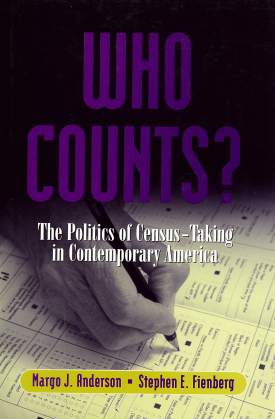
Who Counts?
About This Book
One of Choice Magazine's Outstanding Academic Books of 2000
For those interested in understanding the historical and scientific context of the census adjustment controversy, Who Counts? is absolutely essential reading. —Science
Ever since the founding fathers authorized a national headcount as the means of apportioning seats in the federal legislature, the decennial census has been a political battleground. Political power, and more recently the allocation of federal resources, depend directly upon who is counted and who is left out. Who Counts? is the story of the lawsuits, congressional hearings, and bureaucratic intrigues surrounding the 1990 census. These controversies formed largely around a single vexing question: should the method of conducting the census be modified in order to rectify the demonstrated undercount of poor urban minorities? But they also stemmed from a more general debate about the methods required to count an ever more diverse and mobile population of over two hundred million. The responses to these questions repeatedly pitted the innovations of statisticians and demographers against objections that their attempts to alter traditional methods may be flawed and even unconstitutional.
Who Counts? offers a detailed review of the preparation, implementation, and aftermath of the last three censuses. It recounts the growing criticisms of innaccuracy and undercounting, and the work to develop new enumeration strategies. The party shifts that followed national elections played an increasingly important role in the politization of the census, as the Department of Commerce asserted growing authority over the scientific endeavors of the Census Bureau. At the same time, each decade saw more city and state governments and private groups bringing suit to challenge census methodology and results. Who Counts? tracks the legal course that began in 1988, when a coalition led by New York City first sued to institute new statistical procedures in response to an alleged undercount of urban inhabitants. The challenge of accurately classifying an increasingly mixed population further threatens the legitimacy of the census, and Who Counts? investigates the difficulties of gaining unambiguous measurements of race and ethnicity, and the proposal that the race question be eliminated in favor of ethnic origin. Who Counts? concludes with a discussion of the proposed census design for 2000, as well as the implications of population counts on the composition and size of Congress. This volume reveals in extraordinary detail the interplay of law, politics, and science that propel the ongoing census debate, a debate whose outcome will have a tremendous impact on the distribution of political power and economic resources among the nation's communities.
MARGO J. ANDERSON is professor of history and urban studies at the University of Wisconsin–Madison.
STEPHEN E. FIENBERG is Maurice Falk University Professor of Statistics and Social Change at Carnegie Mellon University.
A Volume in the RSF Census Series
RSF Journal
View Book Series
Sign Up For Our Mailing List
Apply For Funding
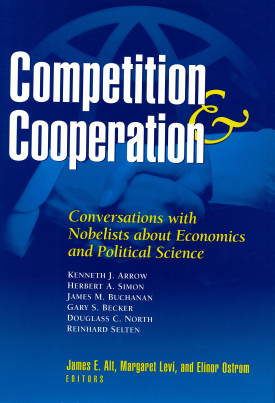
Competition and Cooperation
About This Book
What can the disciplines of political science and economics learn from one another? Political scientists have recently begun to adapt economic theories of exchange, trade, and competition to the study of legislatures, parties, and voting. At the same time, some of the most innovative and influential thinkers in economics have crossed the boundaries of their discipline to explore the classic questions of political science. Competition and Cooperation features six of these path-breaking scholars, all winners of the Nobel Prize for Economics, in a series of conversations with more than a dozen distinguished political scientists. The discussions analyze, adapt, and extend the Nobelists' seminal work, showing how it has carried over into political science and paved the way for fruitful cooperation between the two disciplines.
The exchanges span all of the major conceptual legacies of the Nobel laureates: Arrow's formalization of the problems of collective decisions; Buchanan's work on constitutions and his critique of majority rule; Becker's theory of competition among interest groups; North's focus on insecure property rights and transaction costs; Simon's concern with the limits to rationality; and Selten's experimental work on strategic thinking and behavior.
As befits any genuine dialogue, the traffic of ideas and experiences runs both ways. The Nobel economists have had a profound impact upon political science, but, in addressing political questions, they have also had to rethink many settled assumptions of economics. The standard image of economic man as a hyper-rational, self-interested creature, acting by and for for himself, bears only a passing resemblance to man as a political animal. Several of the Nobelists featured in this volume have turned instead to the insights of cognitive science and institutional analysis to provide a more recognizable portrait of political life.
The reconsideration of rationality and the role of institutions,in economics as in politics, raises the possibility of a shared approach to individual choice and institutional behavior that gives glimmers of a new unity in the social sciences. Competition and Cooperation demonstrates that the most important work in both economics and political science reflects a marriage of the two disciplines.
JAMES E. ALT is Frank G. Thomson Professor of Government and director of the Center of Basic Research in the Social Sciences at Harvard University.
MARGARET LEVI is professor of political science and Harry Bridges Chair in Labor Studies, University of Washington, Seattle. She is also director of the University of Washington Center for Labor Studies.
ELINOR OSTROM is codirector of the Workshop in Political Theory and Policy Analysis and the Center for the Study of Institutions, Population, and Environmental Change at Indiana University, Bloomington. She is also Arthur F. Bentley Professor of Political Science.
CONTRIBUTORS: James E. Alt, Kenneth J. Arrow, Gary S. Becker, James M. Buchanan, Norman Frohlich, Barbara Geddes, Robert E. Goodin, Russell Hardin, Bryan D. Jones, Robert O. Keohane, David D. Laitin, Margaret Levi, Douglass C. North, Joe A. Oppenheimer, Elinor Ostrom, Vincent Ostrom, Ronald Rogowski, Norman Schofield, Thomas Schwartz, Reinhard Selten, Kenneth A. Shepsle, and Herbert A. Simon.
RSF Journal
View Book Series
Sign Up For Our Mailing List
Apply For Funding
The Legal System
About This Book
Examines the impact of social forces on the legal system and how the rules and orders promulgated by that legal system affect social behavior. Dr. Friedman explores the relationship between class structure and the work of legal systems in the light of the existing literature and analyzes the influence of the cultural elements contained in a legal system. In a comprehensive analysis of the concept of legal culture, the author sheds new light on the development of our legal norms and the types of legal systems which prevail in a democracy.
LAWRENCE M. FRIEDMAN is Marion Rice Kirkwood Professor of Law at Stanford University.
Download
RSF Journal
View Book Series
Sign Up For Our Mailing List
Apply For Funding
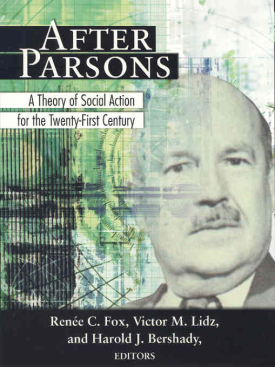
After Parsons
About This Book
Esteemed twentieth-century sociologist Talcott Parsons sought to develop a comprehensive and coherent scheme for sociology that could be applied to every society and historical epoch, and address every aspect of human social organization and culture. His theory of social action has exerted enormous influence across a wide range of social science disciplines. After Parsons, edited by Renée Fox, Victor Lidz, and Harold Bershady, provides a critical reexamination of Parsons' theory in light of historical changes in the world and advances in sociological thought since his death.
After Parsons is a fresh examination of Parsons' theoretical undertaking, its significance for social scientific thought, and its implications for present-day empirical research. The book is divided into four parts: Social Institutions and Social Processes; Societal Community and Modernization; Sociology and Culture; and the Human Condition. The chapters deal with Parsons' notions of societal community, societal evolution, and modernization and modernity. After Parsons addresses major themes of enduring relevance, including social differentiation and cultural diversity, social solidarity, universalism and particularism, and trust and affect in social life. The contributors explore these topics in a wide range of social institutions—family and kinship, economy, polity, the law, medicine, art, and religion—and within the context of contemporary developments such as globalization, the power of the United States as an "empireless empire," the emergence of forms of fundamentalism, the upsurge of racial, tribal, and ethnic conflicts, and the increasing occurence of deterministic and positivistic thought.
Rather than simply celebrating Parsons and his accomplishments, the contributors to After Parsons rethink and reformulate his ideas to place them on more solid foundations, extend their scope, and strengthen their empirical insights. After Parsons constitutes the work of a distinguished roster of American and European sociologists who find Parsons' theory of action a valuable resource for addressing contemporary issues in sociological theory. All of the essays in this volume take elements of Parsons' theory and critique, adapt, refine, or extend them to gain fresh purchase on problems that confront sociologists today.
RENÉE C. FOX is the Annenberg Professor Emerita of the Social Sciences and senior fellow at the Center for Bioethics at the University of Pennsylvania and research associate at Queen Elizabeth House at the University of Oxford.
VICTOR M. LIDZ, a sociologist, is assistant professor in the Department of Psychiatry at Drexel University College of Medicine.
HAROLD J. BERSHADY is professor emeritus of sociology at the University of Pennsylvania.
CONTRIBUTORS: Jeffrey C. Alexander, Robert N. Bellah, Harold J. Bershady, Charles Camic, Renée Fox, Uta Gerhardt, Mark Gould, Donald N. Levine, Victor M. Lidz, Giuseppe Sciortino, Neil J. Smelser, Helmut Staubmann, Jeremy Tanner, Edward A. Tiryakian, and Harald Wenzel
Download
RSF Journal
View Book Series
Sign Up For Our Mailing List
Apply For Funding
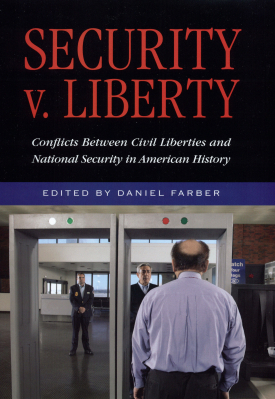
Security v. Liberty
About This Book
In the weeks following 9/11, the Bush administration launched the Patriot Act, rejected key provisions of the Geneva Convention, and inaugurated a sweeping electronic surveillance program for intelligence purposes—all in the name of protecting national security. But the current administration is hardly unique in pursuing such measures. In Security v. Liberty, Daniel Farber leads a group of prominent historians and legal experts in exploring the varied ways in which threats to national security have affected civil liberties throughout American history. Has the government’s response to such threats led to a gradual loss of freedoms once taken for granted, or has the nation learned how to restore civil liberties after threats subside and how to put protections in place for the future?
Security v. Liberty focuses on periods of national emergency in the twentieth century—from World War I through the Vietnam War—to explore how past episodes might bear upon today’s dilemma. Distinguished historian Alan Brinkley shows that during World War I the government targeted vulnerable groups—including socialists, anarchists, and labor leaders—not because of a real threat to the nation, but because it was politically expedient to scapegoat unpopular groups. Nonetheless, within ten years the Supreme Court had rolled back the most egregious of the World War I restrictions on civil liberties. Legal scholar John Yoo argues for the legitimacy of the Bush administration’s War on Terror policies—such as the detainment and trials of suspected al Qaeda members—by citing historical precedent in the Roosevelt administration’s prosecution of World War II. Yoo contends that, compared to Roosevelt’s sweeping use of executive orders, Bush has exercised relative restraint in curtailing civil liberties. Law professor Geoffrey Stone describes how J. Edgar Hoover used domestic surveillance to harass anti-war protestors and civil rights groups throughout the 1960s and early 1970s. Congress later enacted legislation to prevent a recurrence of the Hoover era excesses, but Stone notes that the Bush administration has argued for the right to circumvent some of these restrictions in its campaign against terrorism. Historian Jan Ellen Lewis looks at early U.S. history to show how an individual’s civil liberties often depended on the extent to which he or she fit the definition of “American” as the country’s borders expanded. Legal experts Paul Schwartz and Ronald Lee examine the national security implications of rapid advances in information technology, which is increasingly driven by a highly globalized private sector, rather than by the U.S. government.
Security v. Liberty shows that civil liberties are a not an immutable right, but the historically shifting result of a continuous struggle that has extended over two centuries. This important new volume provides a penetrating historical and legal analysis of the trade-offs between security and liberty that have shaped our national history—trade-offs that we confront with renewed urgency in a post-9/11 world.
DANIEL FARBER is Sho Sato Professor of Law at the University of California, Berkeley.
CONTRIBUTORS: Alan Brinkley, Stephen Holmes, Ronald D. Lee, Jan Ellen Lewis, L.A. Powe Jr., Ellen Schrecker, Geoffrey R. Stone, John Yoo.
Download
Related Events & Media
RSF Journal
View Book Series
Sign Up For Our Mailing List
Apply For Funding
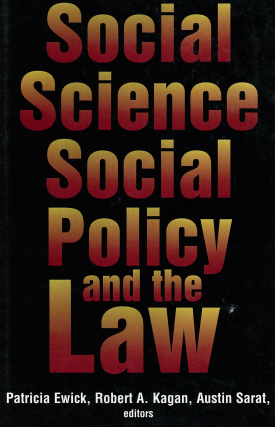
Social Science, Social Policy, and the Law
About This Book
Social science has been an important influence on legal thought since the legal realists of the1930s began to argue that laws should be socially workable as well as legally valid. With the expansion of legal rights in the 1960s, the law and social science were bound together by an optimistic belief that legal interventions, if fully informed by social science, could become an effective instrument of social improvement. Legal justice, it was hoped, could translate directly into social justice. Though this optimism has receded in both disciplines, social science and the law have remained intimately connected. Social Science, Social Policy, and the Law maps out this new relationship, applying social science to particular legal issues and reflecting upon the role of social science in legal thought.
Several case studies illustrate the way that the law is embedded within the tangled interests and incentives that drive the social world. One study examines the entrepreneurialism that has shaped our systems of punishment from the colonial practice of deportation to today's privatized jails. Another case shows how many of those who do not qualify for legal aid cannot afford an effective legal defense with the consequence that economic inequality leads to inequality before the law. Two other studies look at the mixed results of legal regulation: the failure of legal safeguards to stop NASA's fatal 1986 Challenger launch decision, and the complicated effects of regulations to curb conflicts of interest in law firms. These two cases demonstrate that the law's effectiveness can depend, not only on how it is drafted, but also on how well it harmonizes with pre-existing social norms and patterns of self-regulation.
The contributors to this volume share the belief that social science can and should influence legal policymaking. Empirical research is necessary to offset anecdotal evidence and untested assertions. But research that is acceptable to the academy may not stand up in court, and, as a result, social science does not always get a sympathetic hearing from legal decision makers. The relationship between social science and the law will always be complex; this volume takes a lead in showing how it can nonetheless be productive.
PATRICIA EWICK is associate professor of sociology and associate dean at Clark University.
ROBERT A. KAGAN is professor of political science and director of the Center for Law and Society at the University of California at Berkeley.
AUSTIN SARAT is William Nelson Cromwell Professor of Jurisprudence and Political Science at Amherst College and president of the Law and Society Association.
CONTRIBUTORS: Malcolm M. Feeley, Lawrence M. Friedman, Kenneth Mann, Deborah L. Rhode, Neil Vidmar, Jack Katz, David Weisburd, Diane Vaughan, Susan P. Shapiro.
RSF Journal
View Book Series
Sign Up For Our Mailing List
Apply For Funding
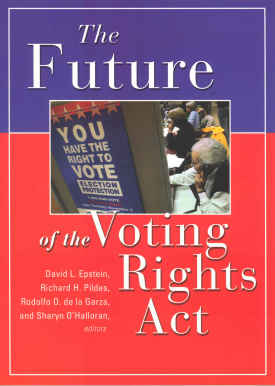
The Future of the Voting Rights Act
About This Book
The Voting Rights Act (VRA) stands among the great achievements of American democracy. Originally adopted in 1965, the Act extended full political citizenship to African-American voters in the United States nearly 100 years after the Fifteenth Amendment first gave them the vote. While Section 2 of the VRA is a nationwide, permanent ban on discriminatory election practices, Section 5, which is set to expire in 2007, targets only certain parts of the country, requiring that legislative bodies in these areas—mostly southern states with a history of discriminatory practices—get permission from the federal government before they can implement any change that affects voting. In The Future of the Voting Rights Act, David Epstein, Rodolfo de la Garza, Sharyn O’Halloran, and Richard Pildes bring together leading historians, political scientists, and legal scholars to assess the role Section 5 should play in America’s future.
The contributors offer varied perspectives on the debate. Samuel Issacharoff questions whether Section 5 remains necessary, citing the now substantial presence of blacks in legislative positions and the increasingly partisan enforcement of the law by the Department of Justice (DOJ). While David Epstein and Sharyn O’Halloran are concerned about political misuse of Section 5, they argue that it can only improve minority voting power—even with a partisan DOJ—and therefore continues to serve a valuable purpose. Other contributors argue that the achievements of Section 5 with respect to blacks should not obscure shortcomings in the protection of other groups. Laughlin McDonald argues that widespread and systematic voting discrimination against Native Americans requires that Section 5 protections be expanded to more counties in the west. Rodolfo de la Garza and Louis DeSipio point out that the growth of the Latino population in previously homogenous areas and the continued under-representation of Latinos in government call for an expanded Section 5 that accounts for changing demographics.
As its expiration date approaches, it is vital to examine the role that Section 5 still plays in maintaining a healthy democracy. Combining historical perspective, legal scholarship, and the insight of the social sciences, The Future of the Voting Rights Act is a crucial read for anyone interested in one of this year’s most important policy debates and in the future of civil rights in America.
DAVID L. EPSTEIN is professor of political science at Columbia University.
RICHARD H. PILDES is Sudler Family Professor of Constitutional Law at New York University School of Law.
RODOLFO O. DE LA GARZA is faculty fellow in the Department of Political Science and director of the Project on Immigration, Ethnicity, and Race at the Institute for Social and Economic Research and Policy at Columbia University.
SHARYN O'HALLORAN is the George Blumenthal Professor of Politics and professor of international and public affairs at Columbia University.
CONTRIBUTORS: David L. Epstein, Richard H. Pildes, Rodolfo O. de la Garza, Sharyn O'Halloran, Stephen Ansolabehere, Thomas Brunell, Bruce E. Cain, Guy-Uriel E. Charles, Louis DeSipio, Luis Fuentes-Rohwer, Heather K. Gerken, Bernard Grofman, Richard L. Hasen, Samuel Issacharoff, Karin MacDonald, Peyton McCrary, Laughlin McDonald, Michael P. McDonald, Spencer Overton, Nathaniel Persily, Christopher Seaman, and Richard Valelly.
Download
RSF Journal
View Book Series
Sign Up For Our Mailing List
Apply For Funding
Pagination
- Previous page
- Page 46
- Next page
